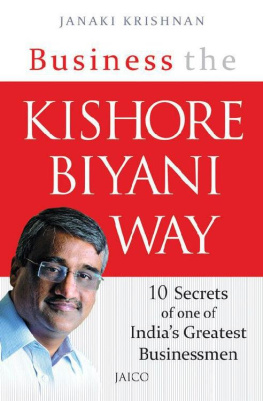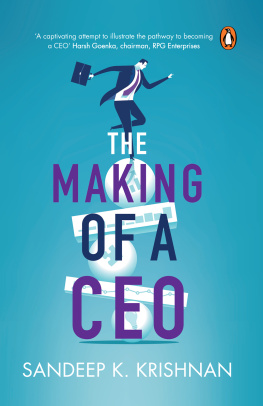Published by Jaico Publishing House
A-2 Jash Chambers, 7-A Sir Phirozshah Mehta Road
Fort, Mumbai 400 001
www.jaicobooks.com
Janaki Krishnan
BUSINESS THE KISHORE BIYANI WAY
ISBN 978-81-8495-640-5
First Jaico Impression: 2015
No part of this book may be reproduced or utilized in any form or by any means, electronic or mechanical including photocopying, recording or by any information storage and retrieval system, without permission in writing from the publishers.
CONTENTS
Preface
Introduction
Kishore Biyanis Retail Kingdom
Fire-fighting: The Biyani Way
Preparing for the Second Innings
1. Recognize Opportunities and Lead the Way
I am passionate about entrepreneurship.
Creating the Future
Cut from a Different Cloth
Pantaloons the Beginning
The Outsider Who Came in from the Cold
Faith in His Vision
Big Bazaar the Hypermarket
Biyanis Lessons
2. Do Things Differently: Rewrite the Rules
I do all the thinking around here.
The Maverick Entrepreneur
Growth versus Profitability
Getting Listed
Not Being Ruled by Accountants
Nothing is Sacrosanct
Creating Consumption
Advertising and Brand-Building
His Land Deals
Sourcing Strategy
The Advantage of Location
Biyanis Lessons
3. Listen to Your Consumers: Get Your Ideas from Them
Customers are our gods.
Lessons from the White Shirt
Observe, Listen and Then Sell
Value for Money
Biyanis Lessons
4. Get the Right People
We always have an emotional relationship with our employees.
Struggle to Recruit
From Pariah to Favored Status
Connecting with His Employees
Biyanis Lessons
5. Create a Winning Situation for Everyone: Build Relationships
Trust begets trust.
Creating Relationships is Key to Closing a Successful Deal
Forging Relationships with Customers
Trust Fosters Relationships
Winning Over His Detractors
Relationships with Employees
Biyanis Lessons
6. Accept Your Mistakes, Learn from Your Failures
We might fail, but that is not going to stop us.
Coping with Mistakes
Spreading Himself too Thin
Converting Setbacks into Opportunities
Not Dwelling on Failures
Biyanis Lessons
7. Keep it Simple
We like being simple and we like simplicity in our ideas. Simple ideas help us accomplish big tasks and overcome challenges.
Organizational Structure
Business and Operations
Complicating Things
Simplicity in Relationships
Biyanis Lessons
8. Need for Speed
Speed is the essence of everything we do.
The Art of Scaling Up Fast!
The Swift Deal-Maker
Biyanis Lessons
9. Think Positive and Adapt to Circumstances
We like to believe there is a promise hidden behind every adverse scenario.
Biyani the Man: No Longer in a Hurry
Moving Forward: Chanting the Retail Mantra
Fashion Station: the Next Stage
Food for Thought
We have to be Present Everywhere
Biyanis Lessons
10. Be Receptive to Local Sensibilities
We take pride in our core value of Indian-ness.
The Diversity of Indian Shoppers
Local Bazaars in Modern Settings
Catering to the Indian Masses
Biyanis Lessons
Appendix
Acknowledgements
About the Author
Postscript
PREFACE
What is leadership?
Is it about managing people? Is it about starting new ventures and building organizations? Is it about being a peoples person? Is it about being an extrovert? Is it about being empathetic? Is it about perseverance?
All through our school and college years, we would have known colleagues who have been active in extracurriculars. They may not have been high achievers in academics but have been popular among the student and teaching community, owing to their dynamic personalities. They tell stories that are riveting; they know all the gossip; some of them are good in dramatics and other non-academic pursuits. They are the ones who help teachers carry books and; are also at the forefront when it comes to doing Christmas decorations and so on.
So are these students potential leaders? It is difficult to say with certainty, because in my experience many such classmates of mine, who were popular in school or at college, have not done anything spectacular in their later years. Of course, they may not have had the opportunity to display their skills and nurture them.
During my years as a business journalist, while tracking the corporate sector in India and overseas, I interacted with people across the corporate hierarchy and found that there is no universal definition or set of attributes that describe leaders. It varies and everyone is successful with his or her distinct qualities.
I am talking about leaders - not just people who are good managers or those who are good at their jobs. We have to draw a distinction between leaders and managers. (Good) managers are people who are good at managing their jobs, people, and the specific domain in which they function. They may or may not be good leaders.
Leadership is a different aspect altogether and has nothing to do with good management. In fact, I have known several leaders who turned out to be lousy managers. Many of them recognize this shortfall by appointing good managers who do the job for them.
Leaders may not be good at execution. Planning, strategizing, thinking ahead may be their forte and they leave it to others to implement the ideas. The basic difference between a leader and a manager is: management is all about taking care of the minutest details while leadership is about looking at the larger picture.
Leaders are those who are able to influence people and lead them despite perceived risks. I think that is one of the most prominent attributes of leadership. Despite what many people think, an organization has leaders at all levels and the person at the top is not necessarily the only leader. A shop- floor supervisor may not be highly paid or have a high profile job but his leadership may be motivating those who work as his subordinates.
Many leaders combine the qualities of both being a strate-gist as well as being a brilliant operative. Examples of these abound in the defence forces where those who are in command display extraordinary abilities. It goes with the job.
I think there are some essential components that are common to all leaders: a vision for an extraordinary future; spotting the opportunities before anyone else; getting others to believe in their ideas; influencing others and most of all an obsessive attachment to and conviction in their dreams. Self-belief, sometimes to the point of arrogance, is another important quality of a competent a leader.










